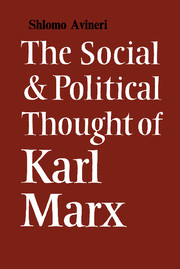Book contents
- Frontmatter
- Contents
- Preface
- TO THE MEMORY OF MY FATHER
- Introduction
- 1 Hegel's political philosophy reconsidered
- 2 The proletariat: the universal class
- 3 Homo faber
- 4 Alienation and property
- 5 Praxis and revolution
- 6 The revolutionary dialectics of capitalist society
- 7 The French Revolution and the terror: the achievements and limits of political revolution
- 8 The new society
- Epilogue: the eschatology of the present
- Bibliography
- Index
8 - The new society
Published online by Cambridge University Press: 05 June 2012
- Frontmatter
- Contents
- Preface
- TO THE MEMORY OF MY FATHER
- Introduction
- 1 Hegel's political philosophy reconsidered
- 2 The proletariat: the universal class
- 3 Homo faber
- 4 Alienation and property
- 5 Praxis and revolution
- 6 The revolutionary dialectics of capitalist society
- 7 The French Revolution and the terror: the achievements and limits of political revolution
- 8 The new society
- Epilogue: the eschatology of the present
- Bibliography
- Index
Summary
UNIVERSAL SUFFRAGE AND ‘AUFHEBUNG DES STAATES’
The major difficulty in understanding Marx's postulate about the abolition of the state is a result of overlooking the dialectical overtones of the term Aufhebung. To this one should add Marx's own admission that even in its higher stage socialist society will require direction and planning at least in economic production, since socialism implies the subjection of man's creative powers to his conscious direction. In The Civil War in France Marx refers to a ‘national delegation’ due to have been established by the Commune, and nowhere does he imply that this new body should ultimately disappear. It is only natural that such statements have caused some consternation. They have given rise to the idea that after all the abolition of the state may have, strictly speaking, no concrete meaning : all it aims at is replacing the coercive power of the state by a legitimate form of social authority. But such an authority, it has been argued, might interfere in the life of the individual even more than the existing, largely minimalist state. The difference between this social authority and the state as we know it today would lie in the derivation of the legitimacy of the new authority from internal identification rather than external coercion. Marx, then, seems to have been the last of the Lutherans.
Part of the difficulty may be avoided by pointing out that there is a marked difference between the terms Marx and Engels used when discussing the ultimate disappearance of the state under socialism.
- Type
- Chapter
- Information
- The Social and Political Thought of Karl Marx , pp. 202 - 249Publisher: Cambridge University PressPrint publication year: 1968

